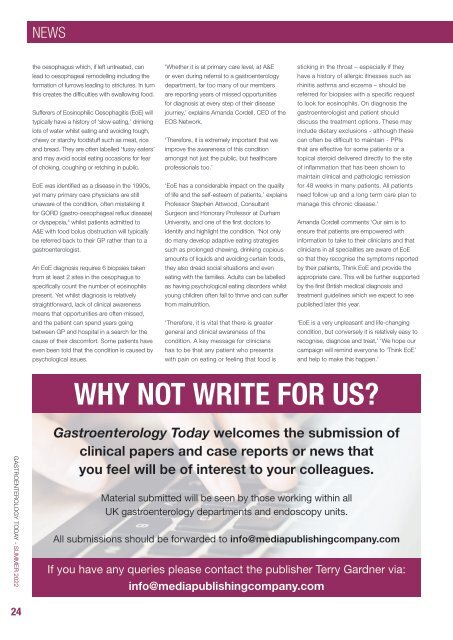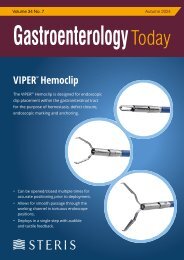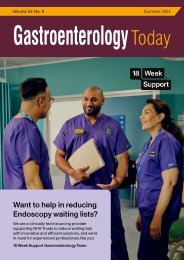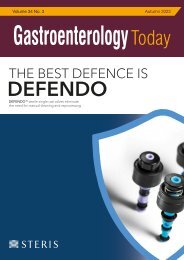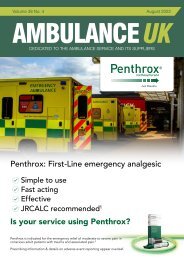Gastroenterology Today Summer 2022
Gastroenterology Today Summer 2022
Gastroenterology Today Summer 2022
Create successful ePaper yourself
Turn your PDF publications into a flip-book with our unique Google optimized e-Paper software.
NEWS<br />
the oesophagus which, if left untreated, can<br />
lead to oesophageal remodelling including the<br />
formation of furrows leading to strictures. In turn<br />
this creates the difficulties with swallowing food.<br />
Sufferers of Eosinophilic Oesophagitis (EoE) will<br />
typically have a history of ‘slow eating,’ drinking<br />
lots of water whilst eating and avoiding tough,<br />
chewy or starchy foodstuff such as meat, rice<br />
and bread. They are often labelled ‘fussy eaters’<br />
and may avoid social eating occasions for fear<br />
of choking, coughing or retching in public.<br />
EoE was identified as a disease in the 1990s,<br />
yet many primary care physicians are still<br />
unaware of the condition, often mistaking it<br />
for GORD (gastro-oesophageal reflux disease)<br />
or dyspepsia, 4 whilst patients admitted to<br />
A&E with food bolus obstruction will typically<br />
be referred back to their GP rather than to a<br />
gastroenterologist.<br />
An EoE diagnosis requires 6 biopsies taken<br />
from at least 2 sites in the oesophagus to<br />
specifically count the number of eosinophils<br />
present. Yet whilst diagnosis is relatively<br />
straightforward, lack of clinical awareness<br />
means that opportunities are often missed,<br />
and the patient can spend years going<br />
between GP and hospital in a search for the<br />
cause of their discomfort. Some patients have<br />
even been told that the condition is caused by<br />
psychological issues.<br />
‘Whether it is at primary care level, at A&E<br />
or even during referral to a gastroenterology<br />
department, far too many of our members<br />
are reporting years of missed opportunities<br />
for diagnosis at every step of their disease<br />
journey,’ explains Amanda Cordell, CEO of the<br />
EOS Network.<br />
‘Therefore, it is extremely important that we<br />
improve the awareness of this condition<br />
amongst not just the public, but healthcare<br />
professionals too.’<br />
‘EoE has a considerable impact on the quality<br />
of life and the self-esteem of patients,’ explains<br />
Professor Stephen Attwood, Consultant<br />
Surgeon and Honorary Professor at Durham<br />
University, and one of the first doctors to<br />
identify and highlight the condition. ‘Not only<br />
do many develop adaptive eating strategies<br />
such as prolonged chewing, drinking copious<br />
amounts of liquids and avoiding certain foods,<br />
they also dread social situations and even<br />
eating with the families. Adults can be labelled<br />
as having psychological eating disorders whilst<br />
young children often fail to thrive and can suffer<br />
from malnutrition.<br />
‘Therefore, it is vital that there is greater<br />
general and clinical awareness of the<br />
condition. A key message for clinicians<br />
has to be that any patient who presents<br />
with pain on eating or feeling that food is<br />
sticking in the throat – especially if they<br />
have a history of allergic illnesses such as<br />
rhinitis asthma and eczema – should be<br />
referred for biopsies with a specific request<br />
to look for eosinophils. On diagnosis the<br />
gastroenterologist and patient should<br />
discuss the treatment options. These may<br />
include dietary exclusions - although these<br />
can often be difficult to maintain - PPIs<br />
that are effective for some patients or a<br />
topical steroid delivered directly to the site<br />
of inflammation that has been shown to<br />
maintain clinical and pathologic remission<br />
for 48 weeks in many patients. All patients<br />
need follow up and a long term care plan to<br />
manage this chronic disease.’<br />
Amanda Cordell comments ‘Our aim is to<br />
ensure that patients are empowered with<br />
information to take to their clinicians and that<br />
clinicians in all specialities are aware of EoE<br />
so that they recognise the symptoms reported<br />
by their patients, Think EoE and provide the<br />
appropriate care. This will be further supported<br />
by the first British medical diagnosis and<br />
treatment guidelines which we expect to see<br />
published later this year.<br />
‘EoE is a very unpleasant and life-changing<br />
condition, but conversely it is relatively easy to<br />
recognise, diagnose and treat,’ ‘We hope our<br />
campaign will remind everyone to ‘Think EoE’<br />
and help to make this happen.’<br />
WHY NOT WRITE FOR US?<br />
GASTROENTEROLOGY TODAY - SUMMER <strong>2022</strong><br />
<strong>Gastroenterology</strong> <strong>Today</strong> welcomes the submission of<br />
clinical papers and case reports or news that<br />
you feel will be of interest to your colleagues.<br />
Material submitted will be seen by those working within all<br />
UK gastroenterology departments and endoscopy units.<br />
All submissions should be forwarded to info@mediapublishingcompany.com<br />
If you have any queries please contact the publisher Terry Gardner via:<br />
info@mediapublishingcompany.com<br />
24


